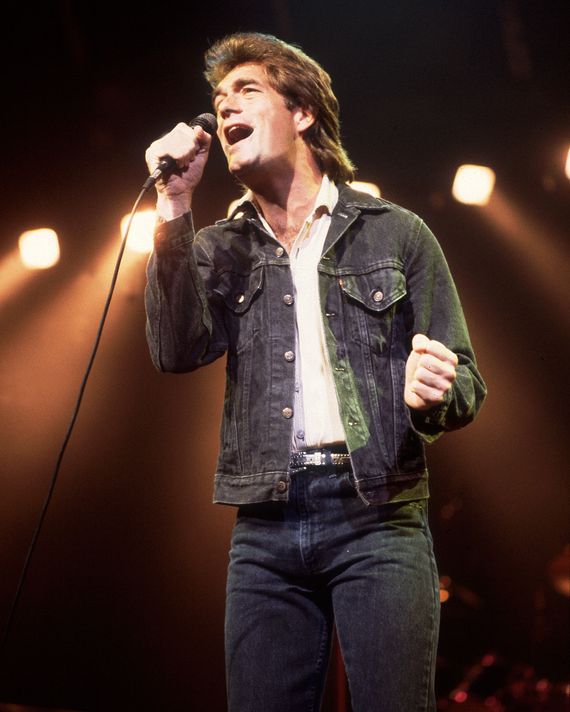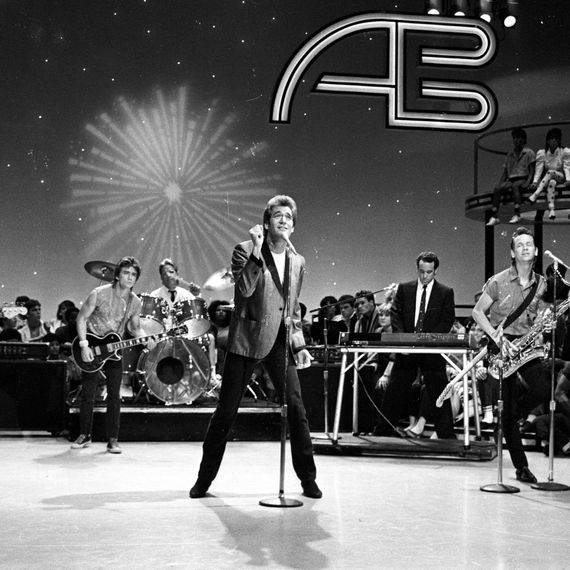
Have you heard the news? It’s been a fabulous 2024 for Huey Lewis — viewers finally got to witness his princely demeanor in the Netflix documentary Greatest Night in Pop, and his songs fueled the soul behind one of the most enjoyable Broadway musicals this season (a musical that deserved Tony recognition and shouldn’t have closed early). Sure, one project is from four decades ago, while the other played in the Theater District. But the timing was fitting. Lewis always used his pop instincts to metamorphose music of the past with his band, the News, and give it a modern edge, which resulted in a prolific streak of hits throughout the ’80s. Some say his tunes are so catchy, so hip, that they can ax businessmen to death to them. “I don’t think there’s such a thing as a song that makes a personal statement about the band,” Lewis says of the infamous American Psycho monologue. “That’s all make-believe stuff for me.”
Lewis’s jukebox musical, The Heart of Rock and Roll, was steeped in the tradition of his sly and meticulously arranged compositions. It told the story of a young man torn between a corporate future at a cardboard-box company and band life on the road, a narrative that has helped Lewis — who lost his hearing several years ago and is unable to perform due to Ménière’s disease — recontextualize many of his songs. When I told him it was disappointing for the show to leave empty-handed on Tony-nomination day, he let out a sigh. “I agree with you. We can’t really figure it out,” Lewis admits. “I don’t know what happened there at the Tonys. Maybe it’s me.” Surely not, man. He takes a beat and continues, “I just try to make the best music, and in my life I’ve made the best music I can. That’s all.”
Most strategically recorded song
It would be any one of the songs on Sports. That was recorded in 1982 and released the following year. In those days, there was no internet. The only avenue to success was through the strength of your songs on the radio. If you wanted to play your own music and make a living, you had to have a hit single. We produced Picture This and Sports ourselves because we knew enough to make commercial choices we could live with. We aimed every song on Sports right at the radio. Interestingly, there are different styles for each song on the album. There’s a rock one and a bluesy one and a country one — only because we knew we needed a hit single. We didn’t know we were going to have five of them. So yes, that was done very strategically. However, we abandoned that on every album after Sports was released. There’s lots of ways to make records, and we didn’t do anything for commercial reasons any more. Being “strategic” means different things. Were Fore! and Small World still strategic? I guess so, but not for commercial reasons.
Song that never got its due
We had a lot of songs that got their due, so it’s pretty hard to complain about the songs that didn’t. That said, we had a record called Four Chords & Several Years Ago, and there was a song on it, a J.J. Jackson cover, called “But It’s Alright.” That should have been a hit. We got into an argument with our record company, and they dropped the record. It’s a long story, but we got into a pissing match with them. They wanted us to do a promotion, which we had already done. They and my manager got in a big fight. There’s a couple other songs buried on Small Word that I’ve always loved. One is “World to Me” and another is “Walking With the Kid,” both of which nobody has ever heard of, I’m sure.
Song where people missed the joke
“Hip to Be Square.” I originally wrote it in the third person: “He used to be a renegade, he used to fool around, couldn’t take the punishment, had to settle down.” It was meant to articulate a phenomenon also written about by David Brooks in Bobos in Paradise: about hippies dropping back in the 1980s. I thought it would be funnier if I told it to myself as opposed to a third person. Unfortunately, some people read it as an anthem for square people, which it was never meant to be.
That’s one thing The Heart of Rock and Roll has been great for, because we’ve been able to three-dimension these songs. For example, “Stuck with You” is obviously a pop song, but it’s funny: “Bound by all the rest, same phone number, all the same friends, and the same address.” It’s a song that’s happy to be silly. Most people just hear it as a pop song and don’t understand the humor behind it. And now the musical has wonderful choreography that emphasizes the humor, and what’s wrong with that? When you write songs, you have to match the words and the music — the music is telling you what it wants to say, if that’s not too perverse.
Best song for the harmonica
“Bad Is Bad” because the harmonica is featured so prominently. It’s a hard instrument. You have to listen a lot, right? You do your homework. The seminal players, or the guys who really started the blues harmonica, were Little Walter and Sonny Boy Williamson. And there’s Big Walter Horton as well — all blues harmonica players know those guys because they wrote the book. They figured it out. They also played through a microphone, like a crystal mic, so that the harmonica would distort a little bit. When it distorted, it sounded a little bit like a saxophone. If you listen to early Little Walter and Sonny, you see they were trying to sound like a saxophone. In many cases these are guys who couldn’t afford a saxophone, so they had a harmonica instead, but they were listening to jazz saxophone players. They all were hugely influential for my own playing, even if some of our songs have the harmonica as an afterthought.
Song that has resonated more with age
All of them, to be honest. I think it’s because my dad was a jazzer. Before MTV and all that, the idea was to write timeless tunes — songs that weren’t necessarily time-sensitive, if you will, and could relate to everybody. All the great standards are that way. They’re not written for kids or adults, they’re written for everybody. You get the inspiration from the muse, I suppose. It’s an artistic thing. It just comes to you, and then the idea is to stay true to the inspiration and be accurate, if that’s not too crazy. The muse comes when she comes. You just wait. You can say, “Let’s go write a song,” and you get with yourself or a couple people and pound out a song, but they’re never the best ones. Rather, the best ones come to you in your sleep sometimes and write themselves. If you could figure out where it came from, you’d go there all the time.
Album that would benefit from a reappraisal
Fore! Our trusty producer and mixer, Bob Clearmountain, was unavailable for the record and that was disappointing. He decided to work with Bruce Springsteen instead for Tunnel of Love, and even though they were only working, like, six hours a day, Bruce had him under contract so Bob couldn’t do anything else until that record was finished. So that meant I had to mix my own record. We mixed it ourselves and it’s not nearly as good as it would’ve been with Bob. In fact, Bob has just remixed it with an Atmos mix and it’s supposed to be amazing. I can’t hear it because my hearing is so bad, but my band members tell me it’s great.
I said earlier that after Sports we never did anything for commercial reasons, and I’ve realized that’s not exactly true. Fore! was the album that followed Sports, but we had “The Power of Love” released in the interim that became a massive hit. Our label was on us to release a new record immediately. They wanted Fore! as soon as possible “because we’re going to ship 2 million units,” or something like that. It was crazy. There was a lot of pressure on us to hurry up on that record, unfortunately. In retrospect, of course it would’ve been great to have Bob mix it and spend a little more time with it. If I had more time, I would’ve approached Fore! differently in every way. I’m never satisfied if I produce a record myself. I’ve heard “The Power of Love” a million times on the radio and I still want to remix it.
Most communal album
I’m going to say Small World. We tried to stretch out a little bit from a creative perspective and I think in some ways it was very successful. In other ways, not so much. People mostly wanted to hear more rock and roll from us, but we all chipped in probably more than any other record. The best song features an amazing saxophone solo from Stan Getz called “Small World (Part Two).” I mean, it’s just a breathtaking solo. I think it’s our strongest musical moment ever, but by any other lot, it wasn’t very successful. Rolling Stone called Small World the worst album of the year. That’s how they assessed it. I thought it was our best. Go figure.
Greatest moment of professional vindication



My looks, maybe. Let’s go with that. [Laughs.] No, we were always told that we weren’t edgy enough. I’m just not an edgy guy, I guess. It was nice that we overcame that. I don’t know if we’re critically acclaimed enough. I’d love to be in the Rock & Roll Hall of Fame, obviously. I want to be in any club that Chuck Berry is a member of, but I don’t make those decisions. That’s above my pay grade. I think it’s inaccurate to say that we’re a pure pop band or an ’80s band. We’re more than that; we’re a rock-and-roll band. We work with a four-piece horn section and have a lot of rhythm and blues in our stuff. That was our first love. Our music is a hybrid, I suppose, of many different things.
A moment you wish was captured for The Greatest Night in Pop
There were a million things that happened. I mean, Ray Charles is playing the piano, and I’m watching him and he says, “Quincy, remember this one?” Quincy responds, “Yeah.” And he looks at me and says, “Lionel was 5 years old when we recorded that record.” I had a great joke-telling session with Bruce Springsteen, who’s very funny. It turns out he’s a very good joke teller — I looked forward to the little stuff with him at the breaks. I got to say hello to Bob Dylan. It was an amazing evening.
Music video that exemplifies the News’s brotherhood
Any one of them, but it took some time to find our video groove. “Do You Believe in Love” was the first single from Picture This, and our record label wanted to do a professional video. They spent a bunch of money on it and hired a fashion-producer guy to shoot us all day long. We’re in pastel colors and matching pastel backgrounds, and we’ve got rouge on our cheeks and makeup. A week later, we went by the record company to see the rough cut. We get in a room, and there’s a bunch of executives from the record company and video company — probably 30 people in total. The director gets up and says, “Now, it’s not colorized. It’s going to look really good when it’s colorized, but here’s a rough cut.” He turns off the lights and plays the video, and my heart sank. It was so bad. There was no direction. This is the video where we’re all singing to a girl in bed. I’m like, What the hell is this? Oh my God, this is terrible. As soon as the video ended, everybody in the room got up and gave us a standing ovation. I remember my thoughts clearly. I was like, There’s no art to this at all. Nobody knows anything about this. We’re writing and producing our own songs so we’re going to do the videos from now on, too. And that’s exactly what we did.
We had the idea that when the song zigs, the video zags. We wanted to avoid a literal translation of the song if at all possible. It’s a shame that you have to tell the story again with a music video when you’ve told the story with a song. There’s a necessary evil here, so why not embrace it and have fun? We can just be funny. We shot most of our videos outside, in San Francisco, and just goofed off and completely avoided the song. We tried to let the city be the production and let the seagulls chew the scenery. I enjoyed it a little bit, but a lot of people didn’t enjoy doing the videos. We were an audio band. We didn’t know anything from a visual standpoint when we started our band, and now suddenly we have to make these videos. We had no choice. You have to embrace it. That was what the market called for.
More From The superlative Series
- Hans Zimmer on His Most Unusual and Underrated Scores
- The Coolest and Craziest of TLC, According to Chilli
- Kim Deal on Her Coolest and Most Vulnerable Music


